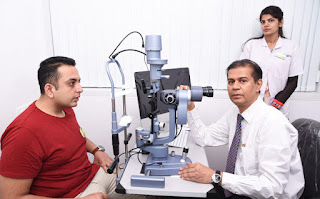Living with Cataract - Ojas eye hospital in Mumbai
Collagen Protein that makes the lens of the eye gets degenerated and vision becomes blurry as the cataract progresses. So, it is always recommended to have a routine eye examination done periodically, even if the cataract is not a problem yet. If you wait and delay the treatment, not only you deprive yourself of good vision but with time chances of successful surgical and visual outcome decreases and there is more susceptibility to develop complications.
What are the symptoms of cataract?
In the early stage symptoms can be so mild that patient might not notice any vision problems and it is usually diagnosed on routine eye check up. Later on patient may complain of hazy and blurry vision, glare, double vision and poor night visibility. To reach at legally blind level, collagen protein clumping has to cover the entire eye lens leading to complete loss of vision.
Moderate symptoms are blurred vision, losing the ability to identify true colour and loss of depth perception, halo formation around the light, increased sensitivity to light and starburst. Clouding of vision hampers with routine activities like reading, cooking, outdoor movements and watching television.
Initially eyeglasses can be of some use, but in advanced cases, cataracts are not only difficult but may have complicated outcomes. For example, people with impaired vision may end up in automobile accidents while driving, fractures can happen due to falls while roadside walking.
Can cataract treatment reverse the vision problem?
The good news is, yes it can reverse the vision problem. As eye is made up of protein and water, with age, the eye lens becomes more rigid and lens protein fibers stick to each other and clumping occurs and it blocks the vision. With the advent of Intraocular lens, getting back your vision is a possibility and having normal eyesight is possible. Cataract surgery is a safe procedure and carried out routinely across the globe. Best results are achieved mostly in those cases where, blindness has not yet occurred due to cataract.
There are multiple options of intraocular lens today like monofocal lens, multifocal lens or toric lens. These different types of lenses are recommended for different types of defects like nearsightedness, farsightedness or astigmatism.
Can we stop the progression of cataract?
As in most cases, cataract is age related, yet lifestyle changes can help in delaying the potential effects of cataract.
Stop smoking and alcohol use – As healthy lifestyle, these habits deteriorates overall health and may lead to the birth of diseases like diabetes, heart conditions and cataract as an associated eye problem.
Eating fresh fruits rich in vitamins and minerals, helps in postponing eye diseases.
What happens if cataract is left untreated?
First of all, cataract surgery is not recommended for everyone and is decided by your eye doctor after the clinical examination. Cataract surgeries are performed in those cases mostly when, patient visibility is hampered at a level that daily activities might lead to dangerous events in the patients daily activity or to the mates around him.
Delaying cataract surgeries may lead to development of a condition known as hyper-mature cataract. This condition may affect the outcome or prognosis of cataract surgery and may result in multiple complications. Few types of cataract have been associated with other eye diseases which are often found hidden behind the opaque lenses and are discovered by ophthalmologist in routine eye examination.
To learn more about eye problems and help you to decide for eye surgery, please call us for appointment at +91-9137462795 and meet our experts at Roseland Building, Junction of Linking Road and Waterfield Road, Bandra, Mumbai- 400050. India.
Tags = Cataract treatment in Mumbai, Cataract specialist in Mumbai, Cataract Surgery In India, Best Cataract hospital In Mumbai, Cataract surgeon in Mumbai, Cataract Surgery in Mumbai


Comments
Post a Comment